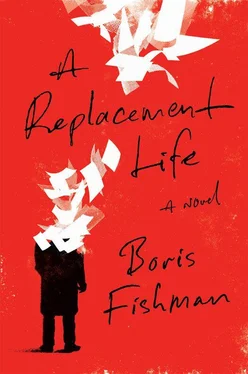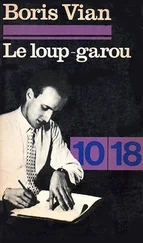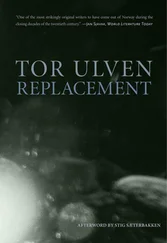“You’re in pieces every time I call.”
“I’m a frail man and my wife’s just passed away, what do you want. Do you know how much I’ve been through?”
“Look, do you know anything about how Grandmother got out of the ghetto? How she made it out, how it all ended?”
“I wish I could say something,” Grandfather said. “I’ve told you everything.”
This conversation had become a nightly ritual, a minyan of two, readings from the slender book of Sofia Gelman née Dreitser. Usually, it went the same way — he had told Slava everything — but Slava called anyway. Sometimes a detail floated up through the murk of his brain, and sometimes Slava called just to make sure he was still breathing.
“I wish I’d made her tell me,” Slava said.
“It was because you loved her that you didn’t,” Grandfather said.
Please describe, in as much detail as you can, where the Subject was during the years 1939 to 1945.
Lazar Rudinsky
Soon after the start of the war, an underground network formed in the Minsk ghetto. We organized contacts between the partisans, couriers from outside the ghetto, and ghetto workers who could carry off radios, iodine, cartridge belts. I worked in a tool shop, where I helped in what you could call a negative capacity. We mixed sand into the lubricant they used to clean their guns. We all tried to do something. Cobblers drove nails up their boots. At the auto-repair shop, they ground emery dust into the engine oil; it melted the bearings when they started their Volkswagens.
There was a neighborhood girl named Ada — she is dead now, may the earth be like down for her — whom I would see once in a while as they marched the work columns back to the ghetto. She was on a detail carting firewood for the building that the Germans were using for headquarters. Your heart dropped seeing these girls: our girls, plus some who had been brought from Austria and Germany. (They called these “the Hamburg girls,” even though they were from all over.) The Belarusian policemen made them walk on the roadway while city people jeered and threw spoiled fruit from the sidewalks. Not everyone — people cried, too, watching these Jewish girls being led to labor like horses.
Ada signaled to me one time; this was March 1943. We had known each other slightly in the neighborhood, but she didn’t circulate with my kind. I was too much a “child of other people’s gardens,” as we used to say. Maybe that’s what made her turn to me for help.
At headquarters, there was a German, a Hauptmann Weidt. He worked in the quartermaster service corps. Weidt had fallen in love with one of the Hamburg girls. Ilse. I had seen her, too. She couldn’t have been over eighteen. God had touched this girl — she was radiant. Weidt was almost three times her age. One afternoon, Ada told me, Ilse and Ada had been pushing a wheelbarrow when Weidt pulled them into a doorway and locked them in a closet. Soon, they heard wailing and that kchyum-kchyum-kchyum that you never forget. They were shooting the girls right in the courtyard. They had made them take off their clothes and shot them, one after the next.
Weidt had no special feeling for Ada, but Ilse, both of whose parents had been buried alive, was nearly mute, so Ada, who knew a little German, which after all is similar to our Yiddish, became like a go-between. It was the two of them he called when it was time to pick up lunch coupons for the work detail. While Ada choked on a pot of soup with beef chunks that Weidt had called up from the mess hall as if for himself, he and Ilse spoke quietly, their language the only thing they shared. Eventually, Weidt decided he wanted to get Ilse out. His rank was too junior for him to do much. The only way was to smuggle her to the partisans.
“What should I do?” Ada whispered to me. “He’s in charge of all the equipment. He can get a work truck for twenty-five people.”
“How do you know it isn’t a trick?” I said.
“I don’t know,” she said. “The way he looks at her? The other day he asked me why Jews were being killed. I nearly jumped out of my skin. I should ask him, the blockhead! He said the German officers used to flirt with the Jewish girls during World War I, and now he has to make me cart firewood.”
Several days before, the Germans had finished off the ghetto orphanage. Kube, the generalkommissar for Belarus, had made a special visit. He threw candies to the children as they were tossed alive into a pit and covered with sand. It was hard to argue for staying. In the next several days, I made contact with a partly Jewish partisan unit in Rusakovichi. The reaction was mixed, but the commander ordered us to go ahead. Weidt refused to arrange so many, but Ada was tough. She said twenty-five or no one. Eventually, he gave in. He was going to come, too.
I went to speak to my father, but he refused to leave without Zeyde, and the partisans wouldn’t take an old, ailing man. Zeyde cursed at my father from the cot, but my father didn’t want to discuss it. My father was a ferryman before the war; he delivered safes by horse cart. This was the age before elevators — he carted the safes to the third and fourth floor on his back. The man died without a file at the medical clinic. So you didn’t argue much with him. He said I would go and they would follow soon after. After all, they’d made it this far. It was just a matter of time before Minsk was liberated. By then we had heard about Moscow, Stalingrad — it seemed like a reasonable thing to say. You believed him when he spoke.
The cover for the truck detail was an assignment to load cement at the railway station, on the outskirts of town. The partisans had said they would be waiting in one of three villages not far from the station. The driver was an ordinary German soldier. He had no idea about Weidt’s plans, but I guess we benefited from the German fanaticism about protocol. As we rolled past the railway station, he didn’t say a word.
After hours of driving from village to village, we stumbled onto a forward unit in Rusakovichi, which we had passed twice. The partisans made a mistake; they thought the driver was Weidt and approached off-guard. The soldier had time to fire off several rounds, killing one partisan and wounding another. Weidt had a bullet in the soldier’s skull before any of the partisans had time to shoot back.
We slept the sleep of the free for the first time since July 1941, not really believing it — Ada and I, with Ilse squeezed between us like a child, in a tiny zemlyanka covered with birch leaves. Weidt they took to the commander’s. We woke to shouting, thinking it had all ended so quickly, but it turned out that one of the partisans had lost his temper and was whaling Weidt. It was his brother who had been killed before in the mix-up with the driver. Weidt had his hands bound; the commander waited some time before interfering.
Weidt was gone by the time we awoke. A girl from night watch told us that he had been taken to partisan headquarters for the area; he had begged to say goodbye to Ilse. We never heard from him again. The Minsk ghetto was liquidated a month later. My father had picked such a terrible instance to be wrong for the first time in his life. When the commander made the announcement, I sat down on the grass and could not stand. Then, when no one was looking, I got some rope and walked off until I was out of sight in a clearing with tall trees. I was testing branches for give when Ada appeared. She had followed me. I wept into her shirt until it was soaked. It was a coarse shirt, fashioned from a sack that once held potatoes, and her skin was raw from it. But she managed to stop me.
A month later, I was ordered to join a mobile fighting unit and didn’t see Ada again until after the war, back in the neighborhood. She kept her distance, like old times, and never mentioned the day in the clearing. One night about six months after the war ended, there was a dance in a little club on Shornaya. There was a bomb crater in one of the walls; they hadn’t had time to fix it. Three quarters of Minsk was on the ground. You could feel the cold air through the wall once in a while. I was with my friends, Ada with hers, but at one point she came over. “Lazar, help,” she said. “There’s a captain over there who keeps asking me to dance. Says he wants to escort me home. I’m frightened.”
Читать дальше











